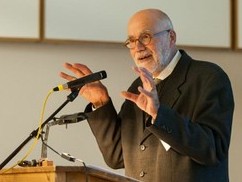Mercator Fellows
Professor Dr Felix Heinzer

Mercator Fellow
Felix Heinzer (born in Zurich, May 9, 1950) is an expert in codicology, liturgy and liturgical poetry, and in the history of monastic libraries (especially those in south-west Germany). His first studies were in Philosophy and Catholic Theology at the Universities of Rome (Gregoriana), Lyon, Chur, Fribourg (Switzerland) and Bonn, and he received his doctoral degree at Fribourg with a thesis on the Christology of Maximus Confessor. After six years as a cataloguer of medieval manuscripts at Karlsruhe (Badische Landesbibliothek), in 1986 he became the Head of the Manuscripts Department at Stuttgart Wurttemberg State Library. In 2005, following his Habilitation at the University of Basel on monastic book culture and ideas of monastic reform in medieval south-west Germany (2001), Felix Heinzer was appointed Professor of Medieval Latin at the Albert-Ludwigs-Universität University of Freiburg (Germany). He has also served as the Wolfgang-Stammler-Gastprofessor für Germanische Philologie at the University of Fribourg/ Schweiz (2002-03) and as internal senior fellow at the Freiburg Research Institute for Advanced Studies (2012).
Heinzer, after his retirement in September 2015, is currently the W. John Bennett Distinguished Visiting Scholar at the Centre for Medieval Studies of the University of Toronto and the Pontifical Institute of Mediaeval Studies and has been invited as Visiting Professor in residence with the University of California's Program in Medieval Studies for fall 2016.
Felix Heinzer has been a member of the Subcommittee of the German Research Foundation (DFG) for the Cataloguing of Manuscripts (1990-2000), of the Committee of the Medieval Studies Working Group at Herzog-August-Library Wolfenbüttel (2003-2013) as well as of the Commission for Medieval German Literature in the Section for Philosophy and History of the Bavarian Academy of Sciences (2005-2015). He is also part of the advisory board of the project 'Corpus monodicum. The monophonic music of the Latin Middle Ages' (since 2012).
